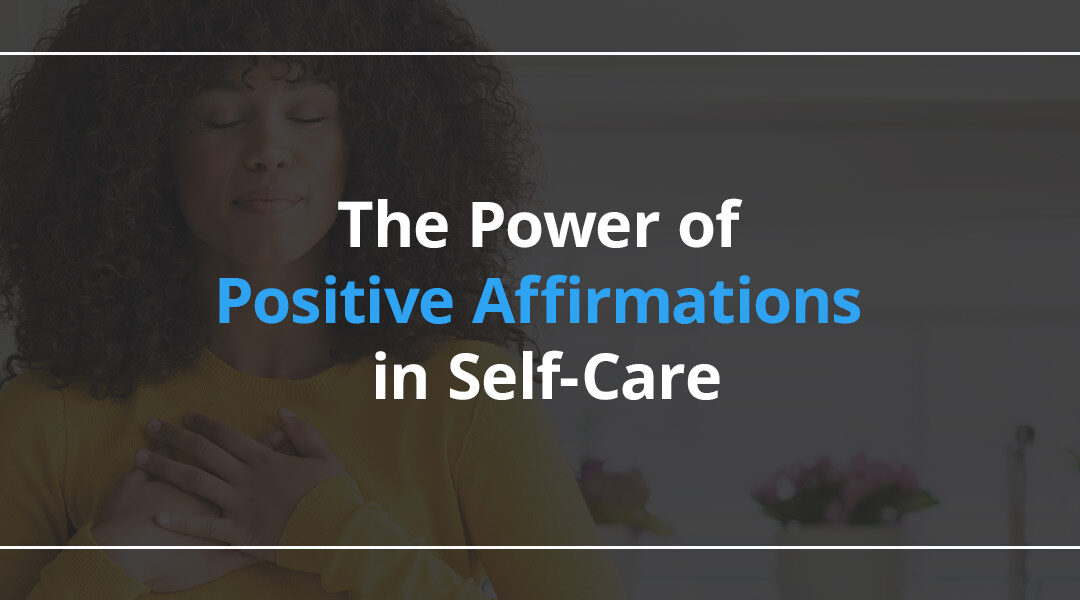What Is Self-Care?
The World Health Organization defines self-care as promoting and maintaining health, preventing disease, and coping with illness or disability without a health worker’s support. Basically, self-care includes everything related to staying happy and healthy. The seven pillars of self-care are physical, environmental, social, recreational, spiritual, emotional and mental. As a result, acts of self-care can include:
- Getting quality sleep
- Prioritizing routine exercise
- Eating healthy, balanced meals
- Spending time doing things you enjoy
- Keeping your home environment clean
- Tweaking your internal dialogue to a kinder tone
How you speak to yourself can be a form of self-care or self-harm. Negative self-talk harms emotional health, including a higher risk of depression, generalized anxiety and social anxiety. Positive self-talk is just as powerful, only far more beneficial. One of the most common forms of positive self-talk is using affirmations.
What Are Positive Affirmations?
Affirmations are positive statements that can challenge and overpower negative and self-sabotaging thoughts. Repeating certain positive words regularly eventually rewires thought processes, replacing negatives with positives.
However, positive affirmations and positive thinking are not the same. While positive thinking refers to a generally pleasant and productive outlook on life, positive affirmations are structured statements people repeat routinely. Positive thinking is the goal, and positive affirmations are a tool to help you achieve this state of being.
Why Are Positive Affirmations Important?
Most of us endure some level of internal bullying at our own hands without fully realizing it. Thoughts like “I’m never going to be successful” and “I’m just not smart enough” might feel natural and uncontrollable. But negative self-speak is as much a learned habit as reaching for a cigarette in a stressful moment. Negative thought patterns emerge over time, eventually becoming the barrier between you and a stable sense of self-worth. Fortunately, kicking a harmful self-talk habit is a lot easier than giving up nicotine.
Self-relevant positive messages can activate the brain’s reward pathways. Some of the benefits of positive affirmations include a stronger sense of personal growth, reduced defensiveness and anxiety, and improved mood. Moreover, positive affirmations may even have a beneficial impact on individuals living with chronic physical health conditions.
Affirmations for You
Learning positive affirmations is a relatively simple self-care act that could transform your life. You can use positive affirmations anytime and anywhere. Whether you stand in front of the mirror and repeat messages out loud or say them silently to yourself, you only need to repeat relevant affirmations until they become habitual internal narratives.
Most affirmative statements start with “I” and have a present tense message. Keep statements short so they’re easy to remember. Using more words can cause the phrase to lose its power simply because longer statements are harder to remember and more challenging to process. You can repeat affirmations silently, but saying them aloud amplifies their power. It might feel awkward to tell your reflection that you are worthy and deserving, but after a few efforts, vocalizing affirmations will feel less silly as your thought patterns start to adjust.
Here are some powerful affirmations that you can use as is or modify for relevance.
Affirmations for Anxiety
While occasional anxiety is unavoidable, it’s still important to adopt tools to cope with anxious thoughts in a healthy way. Positive affirmations are a useful tool, even when anxiety symptoms persist stubbornly. Anxiety disorders involve more than a moment of worry or heightened fear. Nevertheless, affirmations can help you cope with anxious thoughts and regain control of your emotional well-being.
These positive affirmations for anxiety can help you cope:
- “I am safe.”
- “I am on the right path.”
- “I am worthy, and I am loved.”
- “Anxious thoughts are temporary.”
- “I will focus my energy on things I can control.”
- “I trust myself to navigate stressful experiences.”
- “I am rightfully uncomfortable, but this feeling is temporary.”
- “I have anxious thoughts, but I also have the power to change them.”
- “Anxious thoughts are only trying to protect me, but I trust my abilities.”
If you are battling anxious thoughts that are keeping you from restful sleep, it’s worthwhile to modify the affirmations listed above to incorporate sleep-centric statements. For example, you can change “I am safe” to “I am safe, and I have done enough today” or “I am safe right now, and I deserve to rest.” Sleep affirmations for anxiety can help calm your mind to encourage rest.
Affirmations for Depression
Depression, low moods and persistent sadness can be debilitating. These overwhelming emotions can make even the smallest task seem impossible. Seeing the positives in anything can feel unrealistic, and day-to-day life may become an uphill battle.
Practicing these self-affirmations for depression is a simple way to intervene in negative thoughts and encourage a mindset shift.
- “I am proud of myself.”
- “I deserve to be happy.”
- “Sadness is a normal emotion.”
- “I am strong, and I am resilient.”
- “I am loved, and I deserve to be loved.”
- “I am valuable even if I am not productive.”
- “I am overcoming depression one step at a time.”
- “I am having a normal reaction to an unpleasant situation.”
Depressive thoughts can feel challenging to manage, even more so when depression is chronic. While positive affirmations do work and can help counter depressive thoughts, it’s important to know when to reach out for help from a professional. If depression symptoms are impacting your ability to function daily, consult a counselor specializing in depression to work through your symptoms and find a treatment plan that works for you.
Affirmations for Stress
Moderate levels of stress can be helpful. Studies show moderate stress levels can improve memory, boost productivity and even increase alertness. However, when stress levels are consistently high, the consequences to your health can be devastating. Chronic stress can cause insomnia, increased blood pressure and mood problems.
These positive affirmations can help you manage moments of stress before they take over.
- “I am strong, and I am resilient.”
- “I am calm, and I am worthy.”
- “I will get through this.”
- “I am in control.”
- “I value myself.”
- “I trust myself.”
In addition to positive affirmations for stress and anxiety, deep breathing techniques, meditation, exercise and yoga are other ways you can manage stress.
Develop Positive Self-Talk With a Professional
Repeating positive statements benefits mental and emotional health. But sometimes, we need more support to develop these and other coping tools. Questions about starting therapy? Head over to our Frequently Asked Questions page for all the details you need.
The clinicians at Merrimack Valley Psychological Associates can work through your symptoms with you. A supportive mental health professional can help you develop the tools you need to cope. Whether you’re working to overcome persistent depression, anxiety or chronic stress, you are not alone — help is just a few clicks away. Schedule an appointment today!



